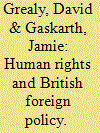| Srl | Item |
| 1 |
ID:
191678


|
|
|
|
|
| Summary/Abstract |
This Special Issue brings the broader history of ‘ethical’ foreign policymaking in the UK into conversation with more contemporary case studies. In doing so, it highlights key issues that have shaped, and will continue to impact, Britain’s ability to play a leading role in the advancement of human rights norms and institutions as a ‘middle power’ within a shifting global order (Cooper and Dal, Citation2016; Efstathopoulos Citation2018; Murray and Brianson Citation2019). For some time, scholarly engagement with the ethics of British foreign policy and human rights promotion was dominated by discussion of New Labour’s foreign policy outlook as articulated in Robin Cook’s ‘mission statement’ for the Foreign and Commonwealth Office (FCO) in May 1997. British foreign affairs, Cook asserted, must have an ‘ethical dimension’ and the Labour government would therefore put human rights ‘at the heart’ of its foreign policy – a line that morphed in the media into ‘ethical foreign policy’ (Guardian, Citation1997). While New Labour has been credited for breaking new ground in terms of British engagement with the international human rights regime, this Special Issue looks to examine periods either side of the Cook era, to gain a wider historical picture of how human rights have been incorporated into British foreign policy (Wheeler and Dunne Citation1998; Gaskarth Citation2006; Gilmore Citation2015).
|
|
|
|
|
|
|
|
|
|
|
|
|
|
|
|
| 2 |
ID:
191679


|
|
|
|
|
| Summary/Abstract |
Following his appointment as Foreign Secretary in February 1977, David Owen framed human rights promotion as a guiding principle of British foreign policy. Sensitive to Iran’s significance as a pro-Western power in the Middle East and appreciative of the opportunities that the Shah’s custom provided for British business, Owen would continue to champion human rights promotion as a central pillar of Britain’s international agenda while simultaneously providing support to the Shah’s dictatorship. This article scrutinises Owen’s attempts to rationalise this fundamental contradiction by constructing a ‘morality of compromise’ which drew inspiration, inter alia, from the value pluralism espoused by the philosopher Isaiah Berlin. In so doing, analysis not only complements and builds upon existing coverage of Anglo-Iranian relations and the marginalisation of human rights concerns therein; it also highlights the importance of moral psychology and its role in shaping ethical foreign policymaking at an individual level.
|
|
|
|
|
|
|
|
|
|
|
|
|
|
|
|